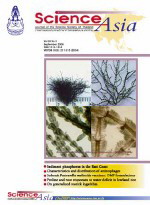ThaiScience
ThaiScience
SCIENCE ASIA
Volume 46, No. 05, Month OCTOBER, Year 2020, Pages 568 - 578
Effect of snps in genes regulating cell cycle control, apoptosis and inflammation on lung cancer susceptibility of northern thai population
Rattanasak Wongkomonched, Bruce Rannala, Phongtape Wiwatanadate, Somchareon Saeteng, Jatupol Kampuansai, Daoroong Kangwanpong
Abstract Download PDF
Northern Thai population has experienced a high incidence of lung cancer and greater rates of mortality over the past several decades. In this study, blood samples and personal information were collected from 91 non-small cell lung cancer patients and 84 cancer-free healthy unrelated volunteers living in northern Thailand. Eight functional SNPs, including cell cycle control (TP53 Pro72Arg, MDM2 T309G, CCND1 G723A, CDKN1A Ser31Arg), apoptosis (FASLG C-844T, FAS G-1378A) and inflammation (TGFB1 T-1347C, TGFB1 Pro10Leu) were genotyped by multiplex allele-specific polymerase chain reactions. Odds ratios (OR) with 95% confidence intervals (CI) were calculated using logistic regression after making adjustments for age, gender and the smoking status of all participating subjects. No significant association between a single SNP and lung cancer risk was observed. However, a combination of TGFB1-1347T and 10Pro allele carriers indicated a significantly increased risk for lung cancer (OR = 2.90, 95% CI = 1.01–8.4, P = 0.049) relative to wild-type genotypes. Among the participants, who had kitchens inside their homes, -1347T allele carriers had significant increase in lung cancer risk (OR = 5.9, 95% CI = 1.32–26.5, P = 0.020) when compared to the TGFB1-1347 C/C genotype carriers. In conclusion, we have observed a significant association between TGFB1-1347T allele and either TGFB1 10Pro allele or having kitchen inside the house on risk elevation of non-small cell lung cancer among the population of northern Thailand.
Keywords
lung cancer, northern Thailand, genetic susceptibilitySCIENCE ASIA
Published by : The Science Society of Thailand
Contributions welcome at : http://www.scienceasia.org/
